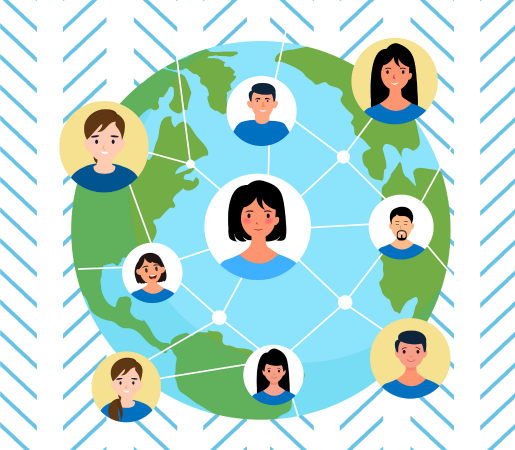In today’s job market, it’s not just what you know – it’s who you know. Networking has become a driving force behind career growth and job opportunities, with more professionals across the UK leaning into it than ever before.
But how influential is it really? In this guide, we explore the latest networking statistics, highlight the key benefits and methods of building strong connections, and debunk some of the most commonly cited networking myths that don’t hold up under scrutiny.
Key networking statistics
- 39% of UK workers found their job through their network.
- 8 in 10 professionals believe that networking is essential for career success.
- Increasing your professional network by 50% will result in a 3.8% higher salary.
- Myth buster: Many claim that 70% of jobs are not even advertised, but there is no study or data which backs this up.
- UK workers attend 7 networking events each year.
- 47% of professionals primarily network to learn new things, while 23% do so mainly to access job opportunities.
- Myth buster: The commonly-cited statistic that 85% of jobs are filled through networking is not backed up by any legitimate evidence.
- 7 in 10 people got their job because of a connection with someone at the company.
- Recruiting via referrals is 47% quicker than job boards.
- 72% of recruiters use LinkedIn to seek out new hires.
- Networking makes B2B sales cycle two-third shorter than just cold calling alone.
- 1 in 4 hiring managers are more likely to hire a referral over an unknown applicant
How important is networking?
A global survey from professional networking site LinkedIn found that 79% of professionals believe that networking is essential for career success.
- Research from the financial services company Empower determined that 38% of those earning at least $100,000 say they wouldn’t make their salaries without their network.
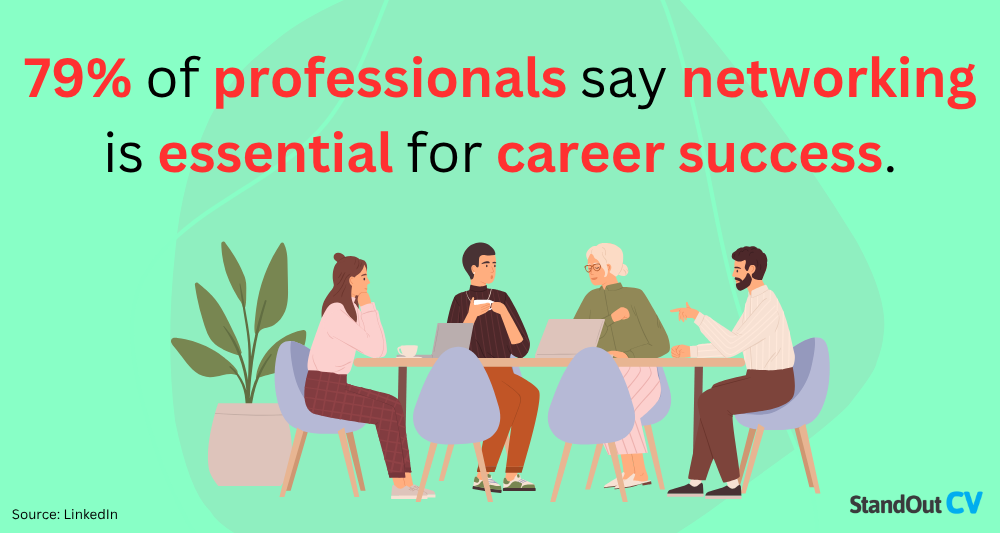

How does networking affect your earnings?
While the majority of professionals feel that networking is essential for career success, it’s important to understand the tangible effect it has on someone’s career.
- According to an academic study by Berardi & Seabright, increasing the size of your professional network by 50% will result in a 3.8% higher salary.
- Another paper in the Journal of Vocational Behavior concluded that an effective network improves how you feel about your career and your future prospects.
Why do people network?
A different paper from the Journal of Vocational Behavior identified 6 key reasons why people network, which are broken down below.
Reasons for professionals networking
| Motivation | Prevalence among professionals |
|---|---|
| Gaining new knowledge | 47% |
| Accessing job opportunities | 23% |
| Enjoyment | 19% |
| Fulfilling work obligations | 15% |
| Helping others | 12% |
| Improving status | 6% |
(Source: Journal of Vocational Behavior)
Reasons for entrepreneurs networking
Beyond workers, networking is also essential for aspiring entrepreneurs – a survey from Chicago Booth Review found that they have their own motivations to network:
| Motivation | Prevalence among entrepreneurs |
|---|---|
| Due diligence on opportunities | 42% |
| Getting management advice | 41% |
| Learning about a new industry | 38% |
| Finding service providers | 37% |
| Identifying best practices | 37% |
(Source: Chicago Booth Review)
- Empower also found that 53% of workers say they’ve helped others in their network land jobs.
How does networking affect job searches?
It is widely understood that networking improves your career prospects: these statistics break down how professional connections can affect the job search process.
A survey from LinkedIn found that 70% of workers landed their job because they had a personal connection to somebody within the company.
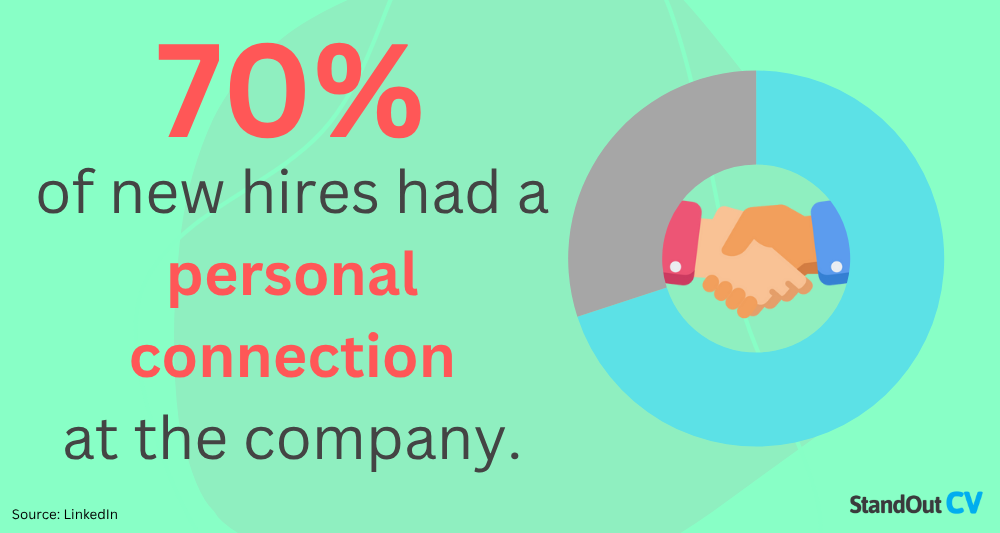

How many jobs aren’t advertised publicly?
MYTH: “70% of jobs aren’t advertised” ❌
Plenty of people make this claim to highlight the ‘hidden job market,’ but there’s simply no credible, up-to-date data backing it. There is no credible data on the number of jobs which aren’t publicly advertised.
How many people get promoted because of their network?
Organisers for Conferences for Women asked attendees how they received their most recent promotion.
- 52.5% cited personal connections as the reason behind their latest promotion.
- 83% of men surveyed said that ‘who you know’ matters as much as how well you do your job.
How does networking benefit employers’ recruitment?
- The recruitment marketing company TalentLyft explains that while applicants from job boards take an average of 55 days to hire and onboard, those who were referred from a connection take just 29 days: this is a 47% decrease.
- Similarly, AptitudeResearch found that 62% of companies reduced the time taken to fill roles when they received employee referrals.
How effective is online networking?
With digital and remote work increasingly common, especially following the Covid-19 lockdowns, online networking has grown more prevalent.
- Over 99% of respondents make use of online networking, according to the Chicago Booth Review.
- The B2B research provider Clutch found that in 2025, 14% of people had found their job through social media.
- LinkedIn’s global survey revealed that 61% of all professionals agree that regular online interaction with their network can lead to new job opportunities.
What are the advantages of online networking?
Research from Forbes Insight uncovered the top reasons why people prefer online networking events and meetings over the traditional, in-person approach.
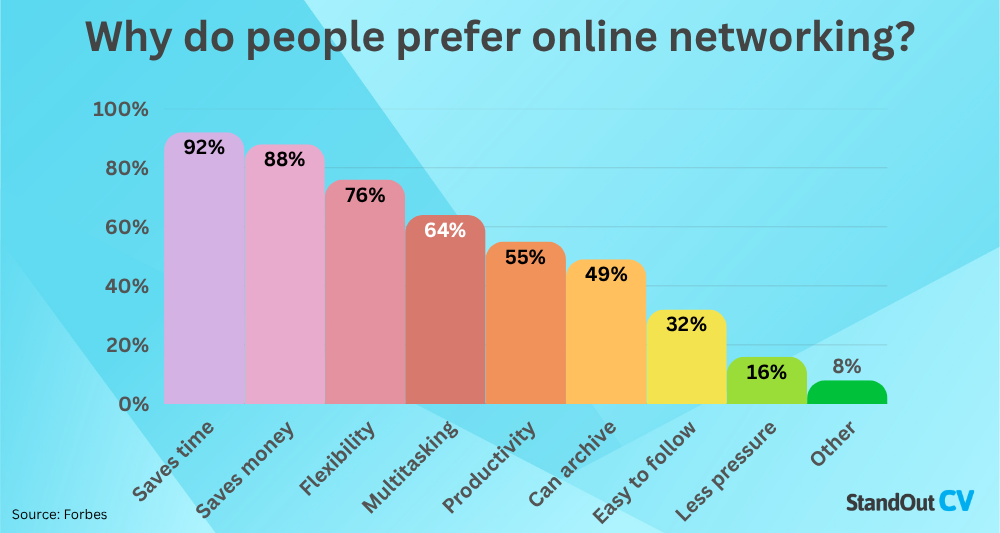

What are the most popular sites for networking?
LinkedIn indisputably ranks as the most popular website for professional networking: it boasts 1.1 billion members in 2025, having almost doubled since 2019. That accounts for 30% of all internet users.
- SocialPilot states that over 11,000 people apply to jobs on LinkedIn every minute.
- 72% of recruiters use LinkedIn to find potential new hires.
- Data from LinkedIn found that a casual conversation on the site has led to an opportunity for 35% of users, while 25% of professionals have found a new business partnership through messaging.
- Beyond LinkedIn, Chicago Booth Review found that 44% of entrepreneurs also use WhatsApp to network, and 37% use Facebook.
How effective is in-person networking?
While online networking events are more popular than ever, a survey from the events planner Endless found that 95% of attendees believe live events still provide valuable opportunities to form connections.
- They also found that 80% of business owners consider live events to be crucial to their company’s success.
- Virtual events planner Kaitura found that 39% go to in-person events with the main intention to build relationships.
- At these events, AuraPrint cites that 72% of people will judge you based on your business card.
What are the advantages of in-person networking?
Despite online networking’s growing popularity, many still value the benefits of face-to-face meetings and events. Forbes Insight breaks down the benefits of in-person networking.
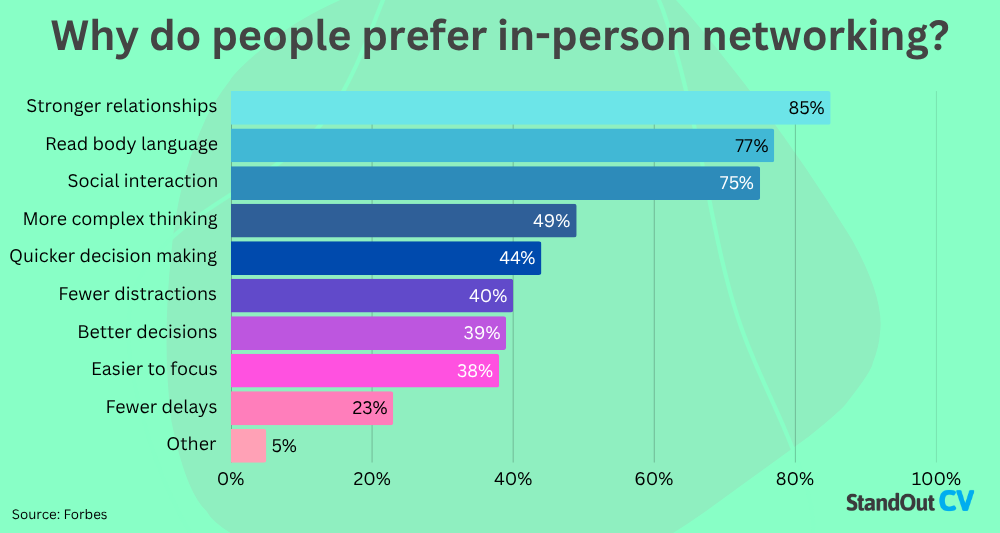

Covid-19’s impact on in-person networking
- Despite what some might expect, DisplayWizard found that 59% of regular exhibitors plan to hold more trade shows than they did before the pandemic.
- In 2024, Bizzabo revealed that the majority of events – 60% – are held in-person, while just 35% are held online (and 5% are hybrid), showing that in-person networking is still valued after the Covid-19 lockdowns.
Business-to-business (B2B) networking
Networking is essential for B2B transactions. In fact, lead generation company Leads At Scale found that 80% of all B2B leads are made through LinkedIn.
Does networking improve sales?
SEO agency FocusDigital found that companies which utilise cold calling take 60 days to close a typical sale, but those who make use of referrals cut the sales cycle length to just 20 days.
- Cold calling company, Cognism, found that cold calling only sees success 2.3% of the time.
Internal networking
While networking is valuable for finding new career and business opportunities, research has also found that sourcing candidates internally has similar success.
Employee referrals
AptitudeResearch found that 84% of employers find that referrals from existing employees are the most cost-effective candidate sourcing strategy, and that making use of referrals is twice as likely to improve the quality of a new hire compared to typical means.
- LinkedIn’s research found that 49% of hiring managers will look more closely at a referral’s application, and 26% are more likely to hire them.
- Referred candidates have less turnover – a study published in Personnel Psychology shows that companies reduced turnover by upwards of 140% by encouraging referrals.
- ATS provider Pinpoint also found that referrals are seven times more likely to be hired than job board applicants.
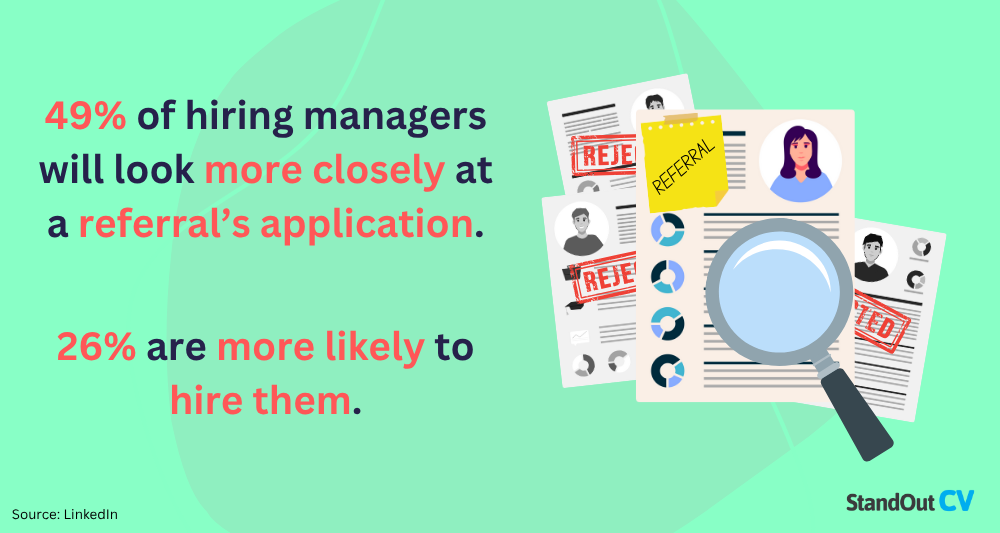

How many jobs are filled through networking?
MYTH: “85% of jobs are filled through networking” ❌
This stat gets thrown around constantly, but there’s no solid evidence behind it. It originally came from a LinkedIn article in 2016 based on a public, non-scientific survey – meaning anyone could take it, and the sample wasn’t random or representative.
According to a thorough debunking by Ed Herzog on LinkedIn, the 85% figure was created by combining different response categories, including some that weren’t even directly related to networking. When you look at the full survey results, only around 11% of people actually said they found their job through networking alone. No large-scale, randomised study confirms anything close to 85%.
Networking by demographic
As with most workplace behaviours, trends emerge when broken down by categories like age, gender, and race.
Which age groups network the most?
A paper published in The Urban Institute found that only 23.6% of 16-24 year-olds reached out to friends or family during a job search, compared to over 30% among those aged above 34.
How does networking different between genders?
Studies have suggested that men have stronger professional networks than women, enabling greater career progression, according to findings from LinkedIn’s Economic Graph White Paper.
- Networking company Chief found that while 57% of men credit a personal connection from their recent promotion, only 48% of women said the same.
- However, they did find that 80% of female leaders have used networking to advance their careers.
- According to LinkedIn, women and men are respectively 13% and 6% more likely to connect with their own gender.
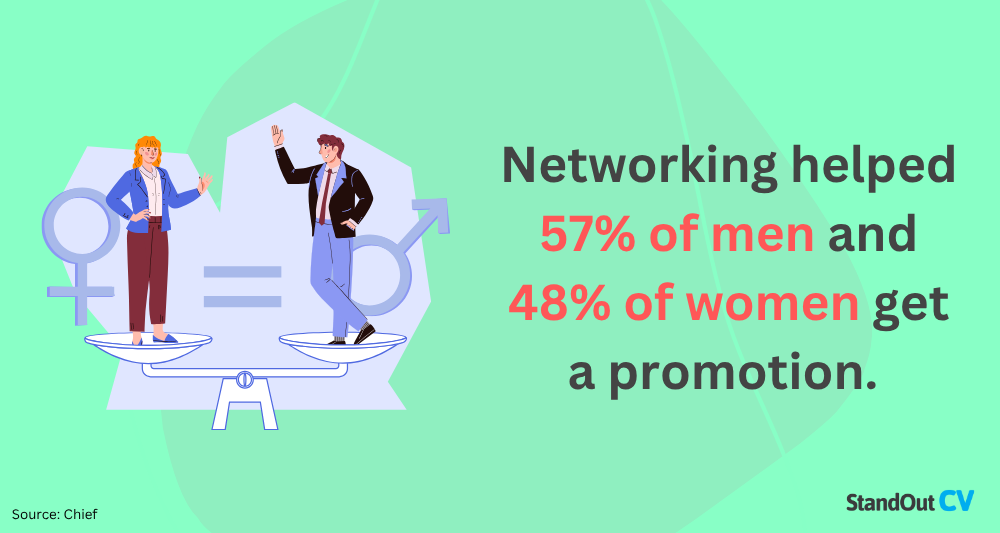

Is race an issue in professional networking?
LinkedIn’s Economic Graph found that members tend to connect with fellow professionals of similar racial backgrounds.
- Black members were 88% more likely to send LinkedIn invitations to other black members (compared to the national average).
- The trend is seen across other racial groups, with Asian, latino, and white members showing intraracial preference, with 53%, 47%, and 23% higher likelihoods respectively.
- A study published in the Quarterly Journal of Economics found that connection requests from black LinkedIn profiles are 13% less likely to be accepted than those from white profiles.
What are the challenges of networking?
Considering the overwhelming benefits of an effective professional network, it’s worth exploring why some professionals are not building or maintaining a network. The below graph draws together research from various sources and breaks it down into the key challenges.
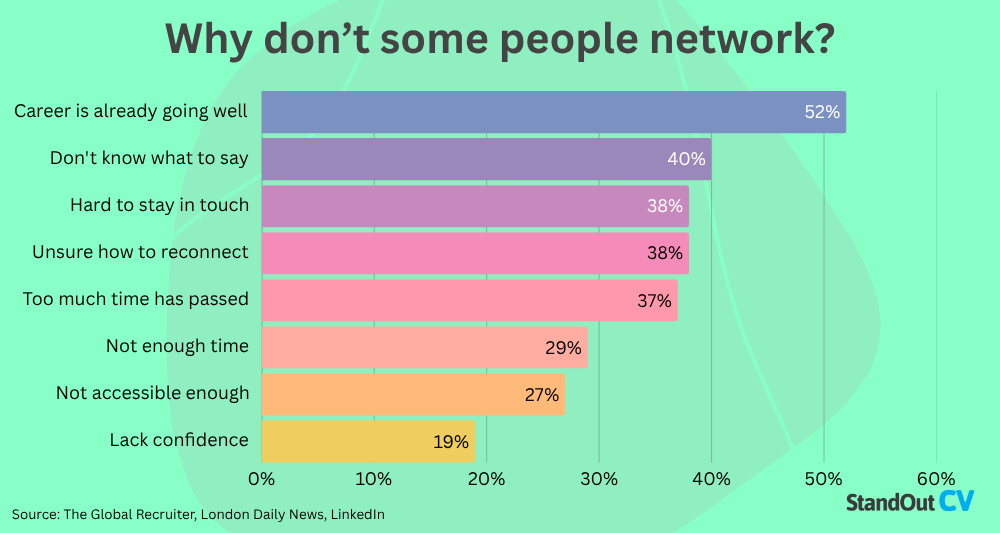

UK networking stats
These UK-wide statistics reveal how common and important networking is across the country, including how British workers network and the impact it has on their careers.
How important is networking in the UK?
In the UK job market, professional networking is more important than ever: 39% of British workers found their job through their network, according to a survey from Money.co.uk.
- Jobs site CWJobs found that 68% of Brits believe that it’s ‘who you know,’ not what you know, that matters most to career success: this is similar to research among US workers, where 83% share this opinion.
- Half of British Gen Z workers secured their job through networking.
In-person networking in the UK
- A survey by DisplayWizard found that 65% of British companies consider in-person trade shows to be essential to their business’ success.
- CWJobs determined that the typical UK worker attends 7 networking events each year.
Online networking in the UK
The growth of digital networking is evident in the UK: 40% of British workers have attended an online networking event before. In fact, 43% prefer online networking events over in-person alternatives, with 29% networking “primarily” on the internet, according to CWJobs.
- 66% of Brits praise online networking for being easier for shy or more reserved professionals.
- Over 44.6 million British workers use LinkedIn, the most popular professional networking website.
- The professional networking platform, Guild, found that the average British LinkedIn user has 150 connections – London has the most, and Belfast the fewest.
- However, they determined that less than 20% of LinkedIn connections provide any substantial value.
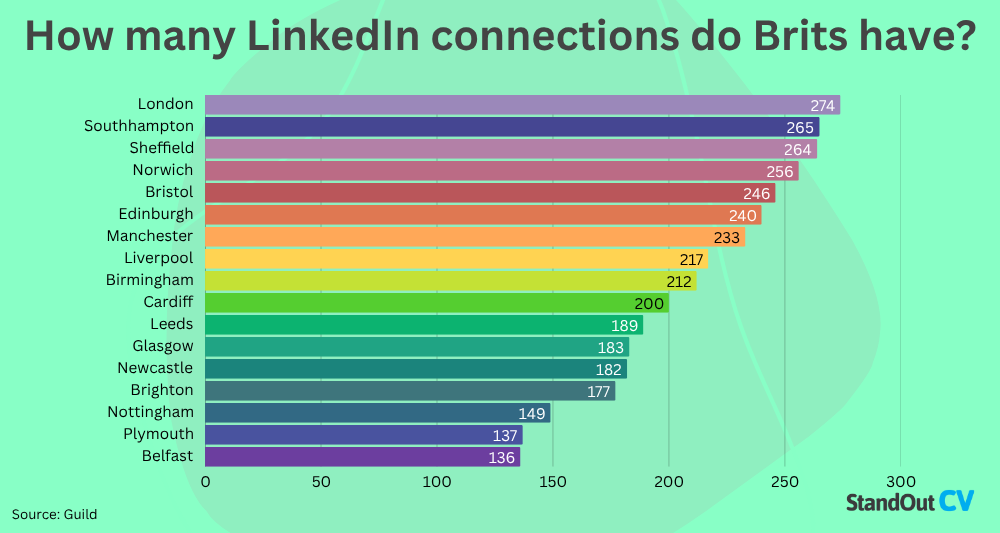
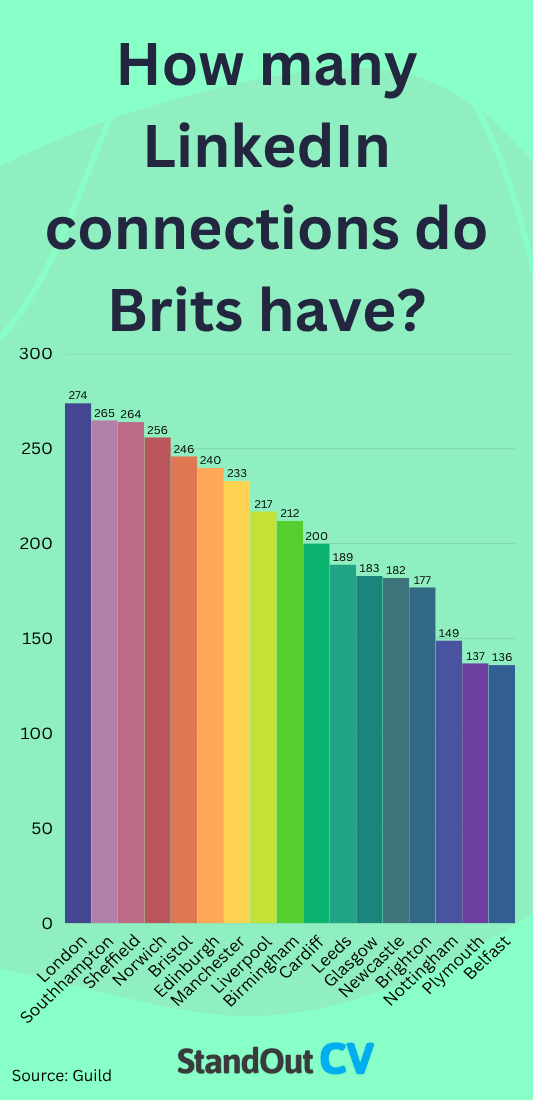
Role of mentorship in networking
- The HR Observer cites that 76% of professionals believe a mentor at work is crucial for career success.
- Retention rates also increased among mentees – Sun Microsystems retained 72% of mentees, compared to just 49% of those who did not have a mentor.
- They also found that 28% of mentees had a salary grade change, compared to the typical 5%.
Sources
- LinkedIn – Eighty-percent of professionals consider networking important to career success: https://news.linkedin.com/2017/6/eighty-percent-of-professionals-consider-networking-important-to-career-success
- Empower – The net worth of your network: How connections lead to money: https://www.empower.com/the-currency/work/generations-network-effect-research
- SSRN – Professional Networks and Their Coevolution with Executives’ Careers: Evidence from Europe and the US: https://papers.ssrn.com/sol3/papers.cfm?abstract_id=2166577
- Journal of Vocational Behavior – Subjective career success: A meta-analytic review: https://www.sciencedirect.com/science/article/abs/pii/S0001879114000761
- Journal of Vocational Behavior – Why do people network? Professional networking motives and their implications for networking behaviors and career success: https://www.researchgate.net/publication/369697823_Why_do_people_network_Professional_networking_motives_and_their_implications_for_networking_behaviors_and_career_success
- Chicago Booth Review – The Network Is an Entrepreneur’s Best Asset: https://www.chicagobooth.edu/review/network-entrepreneurs-best-asset
- LinkedIn – Helping jobseekers take their next step: https://news.linkedin.com/2020/october/helping-job-seekers-take-their-next-step
- Chief – How Networking Differences Play Into Workplace Gender Gaps at the Top: https://chief.com/articles/gender-differences-networking
- TalentLyft – Employee Referral Program: https://www.talentlyft.com/hr-glossary/employee-referral-program
- AptitudeResearch – Solving the sourcing challenge: https://www.aptituderesearch.com/wp-content/uploads/2022/08/Apt_EmployeeRefererral_Report-0822_Final3.pdf
- Clutch – How Do People Find Jobs?: https://clutch.co/resources/how-do-people-find-jobs
- Forbes – The Case for Face-to-Face: https://images.forbes.com/forbesinsights/StudyPDFs/Business_Meetings_FaceToFace.pdf
- Business of Apps – LinkedIn Usage and Revenue Statistics: https://www.businessofapps.com/data/linkedin-statistics/
- SocialPilot – 100+ LinkedIn Statistics One Must Know in 2025: https://www.socialpilot.co/blog/linkedin-statistics
- Endless – 10 Jaw-Dropping Event Marketing Stats That Point to the Future of the Industry: https://helloendless.com/event-marketing-stats/
- Kaitura – State of Virtual Events: https://corp.kaltura.com/wp-content/uploads/2021/11/state-of-virtual-events-2022-kaltura.pdf
- AuraPrint – Business Card Statistics You Didn’t Even Know About: https://aura-print.com/uk/blog/post/business-card-statistics-you-didnt-even-know-about
- DisplayWizard – How Has Covid-19 Affected Trade Show Exhibiting?: https://www.displaywizard.co.uk/covid-19-trade-show-report/
- Bizzabo – The Events Industry’s Top Marketing Statistics, Trends, and Data: https://www.bizzabo.com/blog/event-marketing-statistics
- Leads at Scale – A detailed comparison of lead generation tactics for b2b sales team: https://leadsatscale.com/insights/a-detailed-comparison-of-lead-generation-tactics-for-b2b-sales-team/
- Focus Digital – Average Sales Cycle Length by Industry: 2024 Report: https://focus-digital.co/average-sales-cycle-length-by-industry/
- Cognism – The State of Cold Calling in 2025: https://www.cognism.com/cold-calling-report-2025
- Personnel Psychology – The key to internal networking: https://onlinelibrary.wiley.com/doi/abs/10.1111/peps.12121
- Pinpoint – Referrals are 7x more likely to be hired than job board candidates: https://www.pinpointhq.com/insights/referrals-are-7x-more-likely-to-be-hired-than-job-board-candidates/
- Ed Herzog – No, 85% of All Jobs Are Not Filled Via Networking: https://www.linkedin.com/pulse/85-all-jobs-filled-via-networking-ed-herzog/
- The Urban Institute – Age Differences in Job Loss, Job Search, and Reemployment: https://www.urban.org/sites/default/files/publication/27086/412284-Age-Differences-in-Job-Loss-Job-Search-and-Reemployment.PDF
- LinkedIn – Insights on US Network Homophily and Strength by Gender, Race, and Community Income: https://economicgraph.linkedin.com/blog/insights-on-us-network-homophily-and-strength-by-gender-race-and-community-income
- Quarterly Journal of Economics – Economists studied racial discrimination in LinkedIn job networking. Here’s what they found: https://journalistsresource.org/economics/discrimination-linkedin-network-building/
- The Global Recruiter – Half of Gen Z secure job through network: https://www.theglobalrecruiter.com/half-of-gen-z-secure-job-through-network/
- LondonDaily – Nearly 40% of people have secured a job opportunity through networking, survey reveals: https://www.londondaily.news/nearly-40-of-people-have-secured-a-job-opportunity-through-networking-survey-reveals/
- LinkedIn – Millennials’ Professional Networking Behaviors: https://www.linkedin.com/blog/member/career/millennials-professional-networking-behaviors
- CWJobs – Expanding your network during lockdown: https://www.cwjobs.co.uk/advice/remote-networking
- Statista – Number of LinkedIn users in the United Kingdom (UK) from March 2020 to January 2025: https://www.statista.com/statistics/1314310/uk-linkedin-users/
- Guild – New LinkedIn study highlights changing nature of the platform from ‘professional network’ to ‘marketing platform’: https://guild.co/blog/linkedin-user-research-professional-networking/
- The HR Observer – The Power of Networking: https://www.thehrobserver.com/indepth/the-power-of-networking/
- Sun Microsystems – Workplace Loyalties Change, but the Value of Mentoring Doesn’t: https://knowledge.wharton.upenn.edu/podcast/knowledge-at-wharton-podcast/workplace-loyalties-change-but-the-value-of-mentoring-doesnt/


